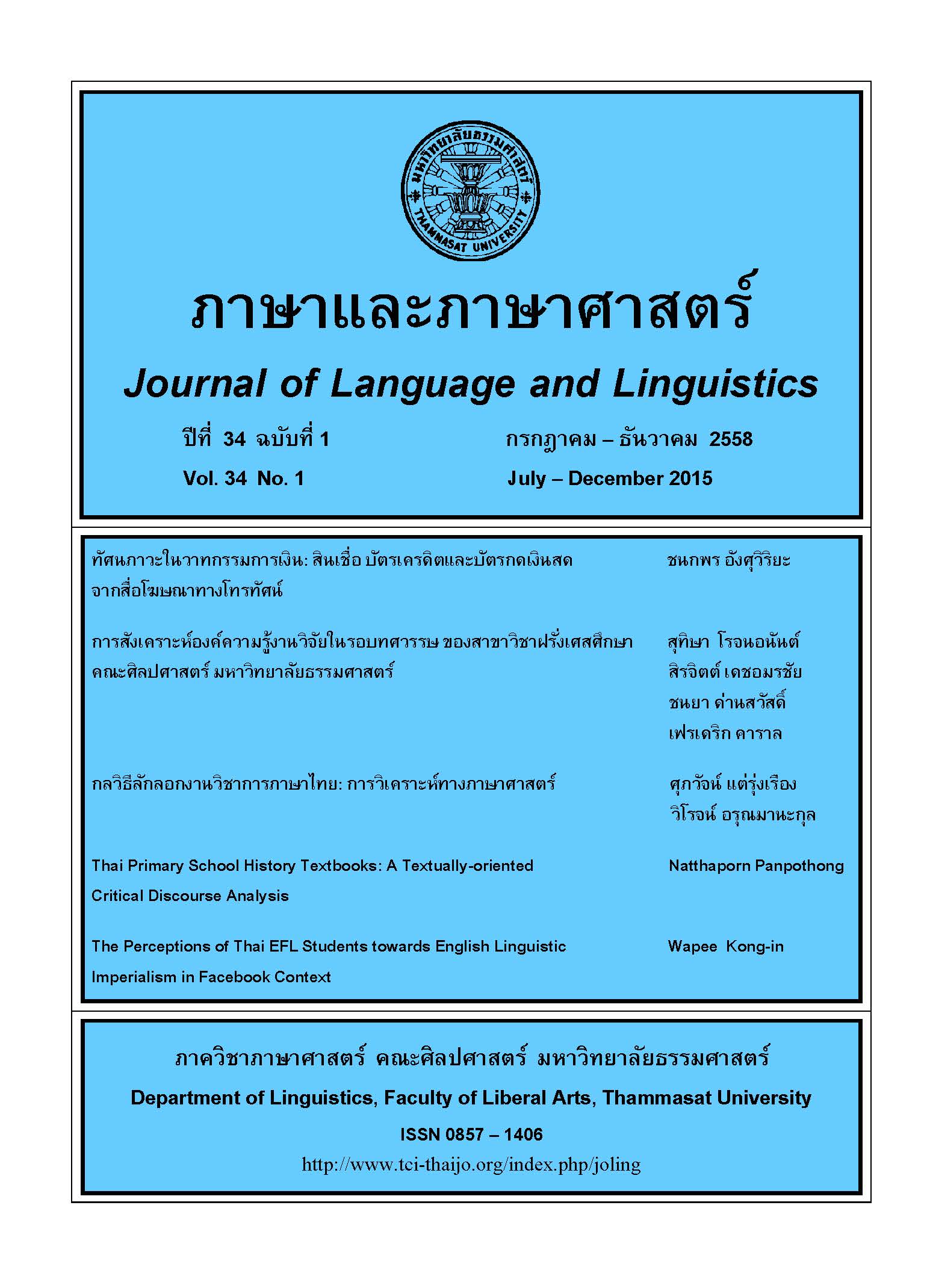ทัศนภาวะในวาทกรรมการเงิน: สินเชื่อ บัตรเครดิตและบัตรกดเงินสดจาก สื่อโฆษณาทางโทรทัศน์
Main Article Content
Abstract
บทความนี้มีวัตถุประสงค์เพื่อศึกษาการใช้คำแสดงทัศนภาวะในวาทกรรมทางการเงินจากสื่อโฆษณาสินเชื่อ บัตรเครดิต และบัตรกดเงินสดทางโทรทัศน์ ผลการศึกษาพบลักษณะการใช้คำแสดงทัศนภาวะ 3 ลักษณะ คือการใช้คำแสดงทัศนภาวะบอกความน่าจะเป็น เช่น คำว่า “อาจ” “อาจจะ” และ “เป็นไปได้” การใช้คำแสดง ทัศนภาวะบอกความจำเป็น เช่น คำว่า “สมควร” และการใช้คำแสดงทัศนภาวะบอกความมั่นใจ ซึ่งเป็นกลุ่มที่พบมากที่สุด สามารถแบ่งกลุ่มย่อยได้เป็น 2 กลุ่ม ได้แก่ ในฐานะผู้ช่วยเหลือ เช่น คำว่า “ช่วยได้” “พร้อมดูแล” “มีทางออกให้” “แน่นอน” ฯลฯ ในฐานะผู้ให้ความหวังหรือผู้ให้ผลประโยชน์ เช่น คำว่า “จัดให้” “ให้เลย” “ก็ได้” “มั่นใจ” ฯลฯ คำแสดงทัศนภาวะของผู้ผลิตล้วนเป็นการให้ความหวัง ความเป็นไปได้ ความมั่นใจและโอกาสของการจะมีเงิน โดยทางธุรกิจจึงไม่ปรากฏถ้อยคำหรือไม่ให้ความสำคัญกับส่วนที่ผู้บริโภคพึงระวังหรือต้องรับผิดชอบ เช่น ดอกเบี้ย ระยะเวลาการชำระกับภาระค่าปรับ ค่าบริการอื่น ๆ ฯลฯ สิ่งสำคัญของการนำเงินในอนาคตมาใช้คือภาวะที่เรียกว่าหนี้สินจะไม่ใช่สิ่งที่ถูกนำมาพูดถึง ความสะดวกรวดเร็วและง่ายจากการนำเงินอนาคตออกมาใช้กลายเป็นประเด็นสำคัญ จากการศึกษาครั้งนี้จึงแสดงให้เห็นว่า วาทกรรมการเงินของคนในสังคมยุคบริโภคนิยมกับการสร้างหนี้ด้วยความพยายามแสดงให้เห็นความจำเป็นต่าง ๆ เช่น การสร้างหลักประกันสุขภาพและอุบัติเหตุ การใช้จ่ายทั่วไปในชีวิตประจาวัน แม้แต่การกินข้าวในร้านอาหารก็สามารถใช้บัตรจ่ายแทนเงินสดด้วยวิธีผ่อนชำระเป็นงวดได้ ผลจากการศึกษาครั้งนี้จึงอาจมีส่วนทำนายแนวโน้มการใช้เงินของคนในอนาคตได้อีกทางหนึ่งด้วย
This article aimed to study use of modal words in financial discourse of loan, credit card and cash withdrawing card in television commercials. The study found 3 types of modal word use which were use of possibility indicators such as ‘may’, ‘may be’ and ‘possibly’, necessity indicators such as ‘appropriately’ and confidence indicators which was found the most and categorized into 2 groups as being a saver to customers such as ‘can help’, ‘being ready to take care’, ‘providing solution’, ‘definitely’ etc. and as being a party who can give hope or benefits such as ‘get it’, ‘get it right now’, ‘possible’, ‘confident’ etc. All the modal words of the producers were offering hope, possibility, confidence and chance to get financial support, so there were no words to create awareness to burdens consumers had to bear or to pay attention to such as ‘interest’, ‘payment period and penalty’ and service fees’, etc. The producers would not mention burdens of spending future money or debt in their commercials. They focused only on speed and ease of drawing future money. This study showed that financial discourse of producers in consumerism society had tried to encourage people to incur debt by listing necessities in their lives such as health care and accident insurances, daily shopping and dinner in restaurants which could be paid in installment. This study, therefore, could also predict trend of people’s spending in the future.
Article Details
บทความทุกบทความเป็นลิขสิทธิ์ของภาษาและภาษาศาสตร์


